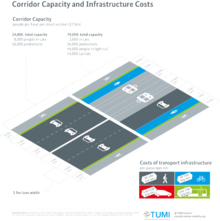Street reclamation

Street reclaiming is the process of converting, or otherwise returning streets to a stronger focus on non-car use — such as walking, cycling and active street life. It is advocated by many urban planners and urban economists, of widely varying political points of view. Its primary benefits are thought to be:
- Decreased automobile traffic with less noise pollution, fewer automobile accidents, reduced smog and air pollution
- Greater safety and access for pedestrians and cyclists
- Less frequent surface maintenance than car-driven roads
- Reduced summer temperatures due to less asphalt and more green spaces
- Increased pedestrian traffic which also increases social and commercial opportunities
- Increased gardening space for urban residents
- Better support for co-housing and infirm residents, e.g. suburban eco-villages built around former streets
Campaigns
[edit]An early example of street reclamation was the Stockholm carfree day in 1969.[1]
Some consider the best advantages to be gained by redesigning streets, for example as shared space, while others, such as campaigns like "Reclaim the Streets", a widespread "dis-organization", run a variety of events to physically reclaim the streets for political and artistic actions, often called street parties. David Engwicht is also a strong proponent of the concept that street life, rather than physical redesign, is the primary tool of street reclamation.
See also
[edit]- Bicycle-friendly – Urban planning prioritising cycling
- Carfree day – Day promoting car-free travel
- Cyclability – Degree of the ease of cycling
- Cycling advocacy – Activities promoting cycling
- Cycling infrastructure – Facilities for use by cyclists
- Green infrastructure – Sustainable and resilient infrastructure
- Greenway (landscape) – Shared-use path or linear park with vegetation
- Linear park – Long strip of naturally occurring land for recreation
- Living street – Traffic calming in spaces shared between road users
- Living Streets (UK) – UK charity for everyday walking
- Pedestrian zone – Urban car-free area reserved for pedestrian use
- Reclaim the Streets – Advocacy group for community ownership of public spaces
- Road diet – Transportation planning technique
- Road expansion – Increasing rate at which roads are being constructed worldwide
- Sustainable city – City designed with consideration for social, economic, environmental impact
- Tactical urbanism – Low-cost, temporary improvement to a city
- Transport geography – branch of geography studying movement of people, goods and information
- Urban green space – Green area planned in an urban location
- Urban vitality – Intensity of use of an urban area
- Walkability – How accessible a space is to walking
- Walking audit – Assessment of pedestrian accessibility
- Wildlife corridor – Connecting wild territories for animals
References
[edit]- ^ "Bilfria dan". Archived from the original on 2022-12-02.
External links
[edit]- RTS — Reclaim the Streets
- Park(ing)
- International Car Free Day - Thailand – 22 September
- What if everyone had a car? by the BBC World News
- [1]
